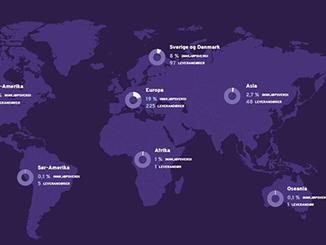In Unil, due diligence assessments mean that human and labour rights, environmental concerns, and animal welfare are addressed in our operations, from raw material production to the store.
Sustainable business practices are integral to Unil's strategy and objectives. We aim to lead by example and offer products that balance economy, society, and the environment, contributing to sustainable development. Consumers should be able to trust that the goods they purchase from us are produced in a manner that respects people, animals, and the environment.
The implementation of due diligence assessments became a legal requirement in Norway in 2022 through the Transparency Act. The purpose of the Transparency Act is "to promote companies' respect for fundamental human rights and decent working conditions in connection with the production of goods and the provision of services." In Unil, we have chosen to also include environmental and animal welfare aspects in our work with due diligence assessments.
Our work is based on the UN Guiding Principles on Business and Human Rights (UNGPs, 2011) and the OECD Due Diligence Guidance for Responsible Business Conduct (OECD, 2018). Our framework for due diligence assessments is grounded in the Universal Declaration of Human Rights, the International Labour Organization's (ILO) Declaration on Fundamental Principles and Rights at Work, and other similar guidelines for environmental, climate, and animal welfare issues.
Read our disclosures
You can find our disclosures in our report Due Diligence Assessments for Sustainable Business Practices – Ethical Trade Norway 2023. The report can be accessed here (Norwegian text). You can also view our Supplier Code of Conduct.
Our framework
Ensuring a sustainable value chain is challenging in an increasingly complex world where climate change, increased consumption, and rapid population growth make our supply chains at times complex. A due diligence assessment is a crucial tool for identifying risks of violations of rights or negative impacts on the environment and climate. We prioritize actions where we see the greatest risks.
The process of identifying risks, assessing, prioritizing, and implementing actions is what we refer to as due diligence assessments.
Our sustainability strategy and our work with due diligence assessments are embedded by the management and the board, and they receive regular reports on our efforts. We have a clear division of responsibilities and tasks within the field. Ethical guidelines are part of our contractual agreements with suppliers, and we have procedures for the selection, approval, collaboration, and follow-up of products and suppliers. We maintain an overview of suppliers and production sites and the origin of raw materials. We conduct risk assessments (Norwegian text) at country level and for raw materials and have a process for prioritizing risks and a plan for actions.
Collaboration and dialogue with stakeholders are integral parts of the framework for due diligence assessments, and we systematically work to gather input from, and involve, relevant stakeholders.
We have a procedure for responsible procurement practices that help prevent and reduce the likelihood of negative impacts. The responsible procurement practices procedure defines roles and responsibilities for implementing responsible procurement practices at all levels of our procurement process.
We have a system for monitoring and following up on our suppliers so that we can address prioritized risk areas. We conduct periodic evaluations of our work with due diligence assessments through internal audits.
If a breach/deviation occurs, we will take measures to ensure that those responsible for the breach in our value chains rectify the damage. Unil has a dedicated procedure for remediation. Where the supplier is responsible for the negative impact/damage, the supplier is also responsible for remediation. The measures are monitored, the effectiveness assessed, and communicated to the relevant parties.
Supplier requirements
We expect our suppliers and partners to work diligently and systematically to comply with our ethical guidelines for suppliers, covering basic requirements for human rights, labour rights, anti-corruption, animal welfare, and the environment. Additionally, we expect our suppliers to:
- Adhere to Unil's guidelines for suppliers and products.
- Take responsibility for remediation where the supplier is responsible for the negative impact/damage.
- Demonstrate willingness and ability for continuous improvement for people, society, environment, and animals through collaboration.
- Upon request from Unil, be able to document how they, and any subcontractors, work to comply with the guidelines.
For more information on how we conduct due diligence assessments, risk assessments, and any findings related to negative impacts in our value chains, please refer to our annual sustainability report and reporting to Ethical Trade Norway.



